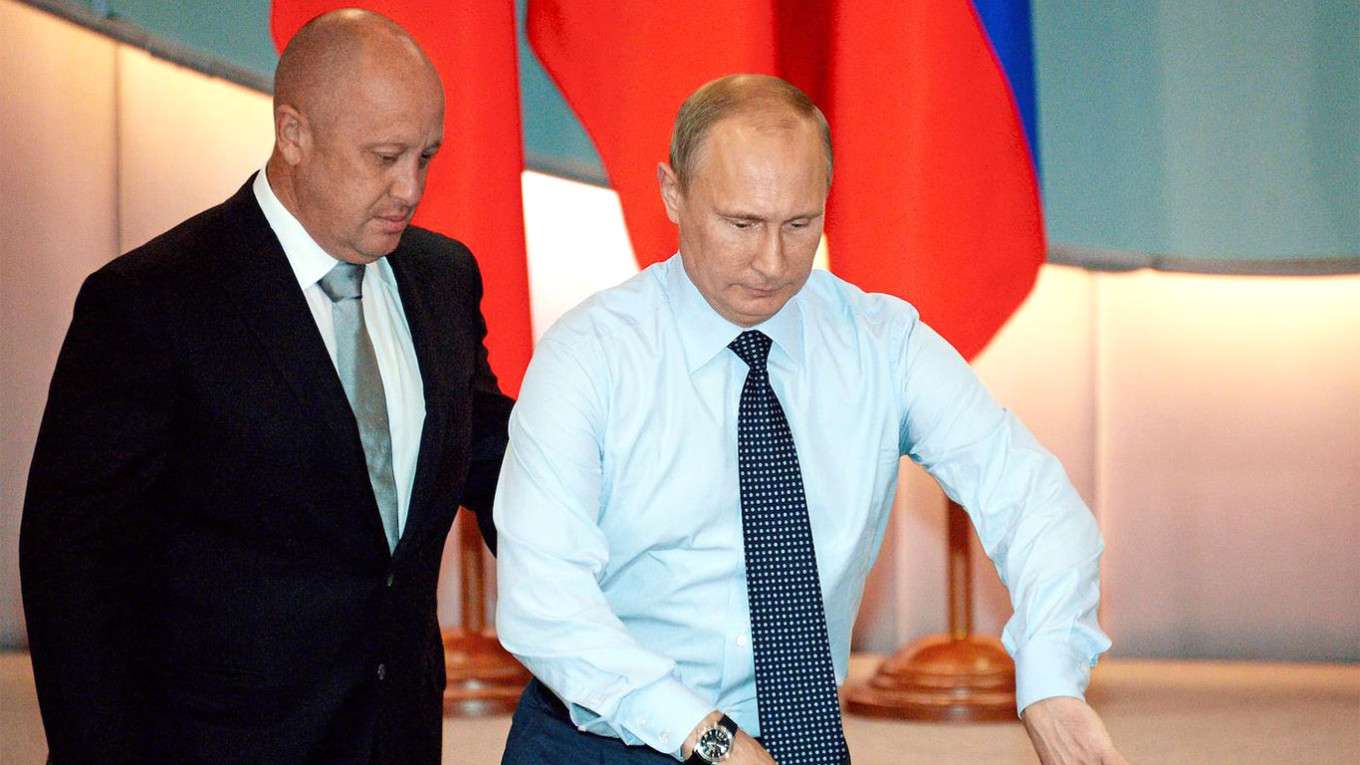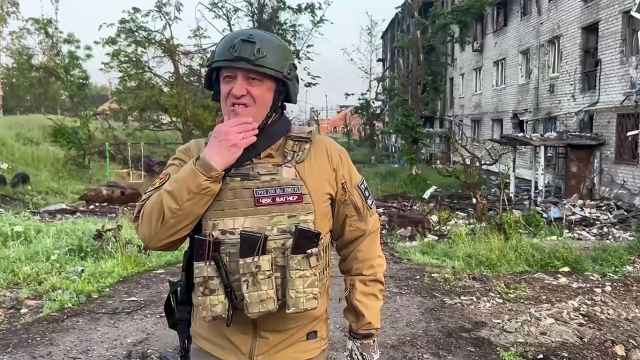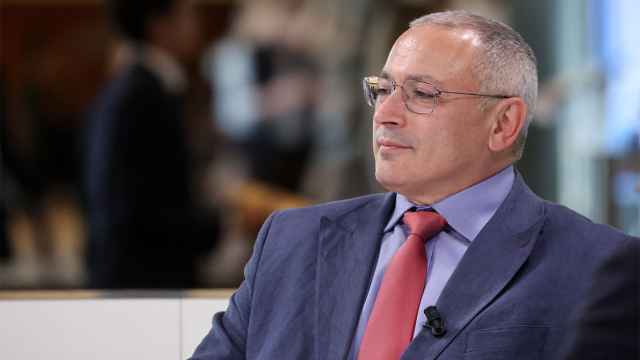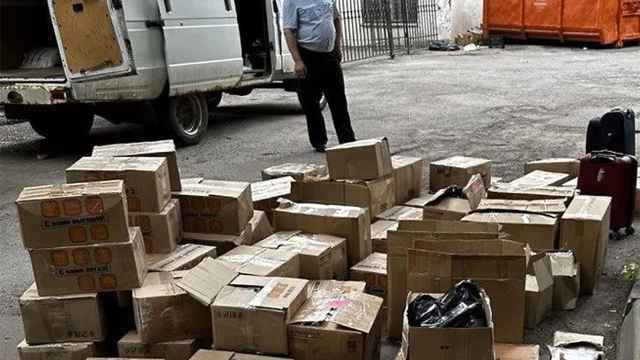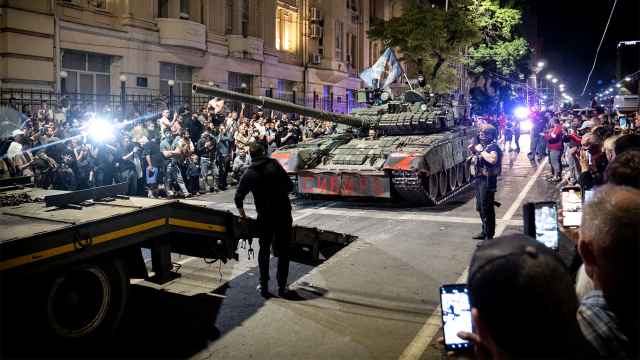President Vladimir Putin is extremely sensitive to disloyalty and prone to looking for traitors everywhere. Knowing this, it is easy to assume that the Russian president had a solid motive to eliminate the leader of the Wagner Group, who dared to challenge the Kremlin in an armed revolt.
However, if we keep focusing on Yevgeny Prigozhin personally and on Putin’s vindictiveness, we risk overlooking the fact that the problem Putin faces is not limited to a single rebellious former restaurateur and thus cannot be solved by assassination alone.
In the wake of Prigozhin’s revolt in June, it became clear that the Russian autocrat would have to cope not just with one eccentric warlord and his mercenaries. He instead has to find a way to deal with a fairly broad group of people who are in favor of tougher policies and a more aggressive military campaign in Ukraine.
Prigozhin in many ways emerged as a prominent spokesperson for this group. In his public statements, he vehemently lashed out against the Russian bureaucracy for insufficient patriotism and insisted on the need for a total mobilization of the country, the complete militarization of the economy, and directing the assets and business practices of the elites toward a national goal.
After the Wagner mutiny, Putin had the option of gaining the backing of supporters of total mobilization by becoming more “Prigozhinized” himself. He could adopt more uncompromising rhetoric, change his political course toward the complete militarization of the country, and launch a campaign of repression against an unpatriotic part of the elite.
However, it seems that Putin is trying to avoid this strategy. The war remains a "special operation," there are no large-scale repressions against the traitors among the elite, and the Russian people are promised that there will be no new military call-up.
At the same time, the most prominent figures associated with the "total mobilization party" are being systematically eliminated from the public sphere. The crash of the airplane, presumably carrying Prigozhin, is not the first event in this series.
Just a day before the crash, it became known that General Sergei Surovikin had been dismissed from his post as commander-in-chief of the Russian Aerospace Forces. Surovikin is known to have had good relations with Prigozhin. Moreover, just like the Wagner leader, he had tense relationships with Russian Defense Minister Sergei Shoigu and the head of the General Staff, Valery Gerasimov. According to some reports, after the Wagner mutiny in June, Surovikin was arrested.
Igor Girkin, another prominent figure in the camp of supporters of total mobilization, was also repressed. Although Prigozhin and Girkin were in conflict, less than a month after Prigozhin's mercenaries marched on Moscow, the leader of the Club of Angry Patriots found himself behind bars.
All these events are not just the aftermath of the Prigozhin revolt. They are also symptoms of an ongoing struggle. Although no one is marching on Moscow now, Putin is still under pressure from the part of the elite that is unhappy with the way he is conducting the war.
Just three days before Prigozhin’s plane crash, Bloomberg reported that some members of Russia’s intelligence services were calling on Putin to fire Shoigu and Gerasimov. They also wanted him to switch to a more aggressive approach to warfare, to launch a full-scale mobilization, and to declare martial law.
Moreover, it is not just about the Russian elite. There is also a noticeable group in Russian society who can be considered supporters of total militarization, and "nationalization" of the elites. In particular, polling by Russian Field shows that 20% of Russian respondents sympathized with Prigozhin even after his mutiny failed.
Moreover, according to the Chronicles project, 22% of Russian poll respondents can be considered core supporters of the war. These are the people who not only say they support the “special military operation,” but also believe that the withdrawal of troops from Ukraine should occur only after the goals of the war have been achieved, and believe that government spending should prioritize the army. It is these people who are likely the ones most receptive to Prigozhin and Girkin-style rhetoric about the total militarization of Russian society.
Putin, however, is not making earnest attempts to win back these so-called “turbo patriots.” Instead, he seeks to suppress the loudest voices from their camp.
In this context, it is not so important whether Prigozhin really died in the plane crash. Moreover, it is arguably not that significant whether it was, in fact, orchestrated by Putin. What matters is that the event is likely to be perceived as Putin’s revenge on Prigozhin.
As a result, all sorts of "angry patriots" are likely to take Prigozhin’s plane crash as a signal that Putin is ready to deal harshly not only with the liberal anti-war opposition, but also with those militant supporters of the war who think he is not decisive and tough enough.
At the same time, it is clear that Putin is still trying to get out of the Wagner crisis while still acting half-heartedly and ambiguously. So, the rebel leader was assassinated. Or, maybe not. The mutineers' main ally among the army leaders was arrested. Or, maybe not. Everything seems to be in preparation for a large-scale military mobilization. But, at the same time, there is a plan to avoid bad news in the run-up to the 2024 presidential election.
Thus, the overall outcome of the two months since the Wagner mutiny is that even though Prigozhin has already lost, Putin is still struggling to win.
The Russian leader turned out to be unable to address some of the fundamental underlying causes that sparked the Wagner crisis. He failed to deal with Prigozhinism in the minds of the people and in the ranks of his own elite. Neither did he sufficiently "Prigozhinize" his own policies and rhetoric by taking a more uncompromising approach to winning the war.
After Prigozhin’s plane crashed, Putin will be believed by many to have demonstrated toughness. However, his more belligerent opponents will likely think that his willpower is aimed primarily at protecting his persistent weakness, indecisiveness, and half-heartedness.
A Message from The Moscow Times:
Dear readers,
We are facing unprecedented challenges. Russia's Prosecutor General's Office has designated The Moscow Times as an "undesirable" organization, criminalizing our work and putting our staff at risk of prosecution. This follows our earlier unjust labeling as a "foreign agent."
These actions are direct attempts to silence independent journalism in Russia. The authorities claim our work "discredits the decisions of the Russian leadership." We see things differently: we strive to provide accurate, unbiased reporting on Russia.
We, the journalists of The Moscow Times, refuse to be silenced. But to continue our work, we need your help.
Your support, no matter how small, makes a world of difference. If you can, please support us monthly starting from just $2. It's quick to set up, and every contribution makes a significant impact.
By supporting The Moscow Times, you're defending open, independent journalism in the face of repression. Thank you for standing with us.
Remind me later.



